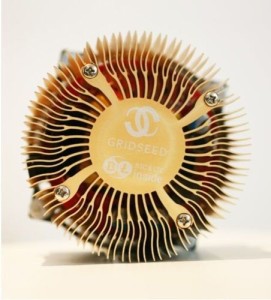A new ASIC Scrypt mining device was released in recent months and has taken the market by storm. Sellers have consistently reported that they are out of stock with some even miss-leading or claiming to have stock “in-hand” which doesn’t actually exist.
The first of their kind, these tiny USB devices boast five GC3355 55nm chips which are capable of mining both the Scrypt and SHA-256 algorithms at lightning speeds and low voltage. According to popular re-seller Zoomhash, “Each Gridseed unit is neatly designed, and comes with a heatsink and fan to keep it running cool”, however some users have taken it upon themselves to test just how far they can be pushed.
According to controversial BitcoinTalk member BitcoinEXpress the Gridseed devices require no fan to remain fully operational whilst mining Scrypt, even when running for long uninterrupted periods. Notably the devices, designed primarily for processing SHA-256 at a colossal 11 GH/s, appear to tolerate temperatures of up to 75C without problems. “The heat sinks are massively over engineered for Scrypt operation which is why Gridseed probably chose to go with a cheap POS low static pressure noisy fan”, explains BitcoinEXpress, perhaps shedding light on why they are not required.
Disclaimer: We take no responsibility for any damages caused by failing to follow manufacturer instructions and/or operating Gridseed devices without a fan.
The power of these devices could change the dynamic of the alternative crypto-currency markets forever despite already being a discontinued line. Manufacturer quotes from the Gridseed website state that, “Gridseed decided to stop the production of mini USB mining machines to meet the demand of the market”, alluding to their new device nicknamed “Little Black”. The next generation miner boasts a massive 80 GC3355 chips and will provide some altcoins with increased network security and potentially fluctuating prices as weaker coins are farmed quickly and sold for Bitcoins.
We are entering a new age where specialist Scrypt mining hardware, once thought to be too difficult or costly to create, is appearing en-masse. Judging by how quickly manufacturers responded to Litecoin trends, how long will it be before other supposedly ASIC-proof algorithms are challenged by hardware?
Have you brought a Gridseed device recently? If so what are your experiences with them and how do you think the increased hashing power will affect common altcoin markets? Will other algorithms fall suit to ASICs?







